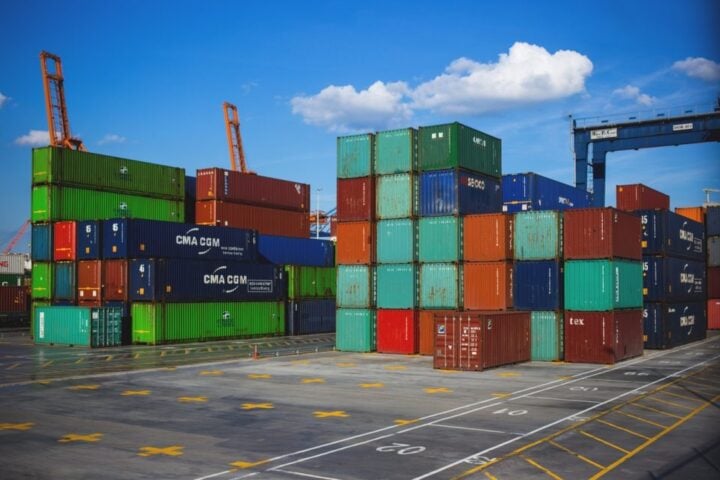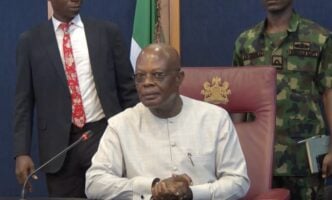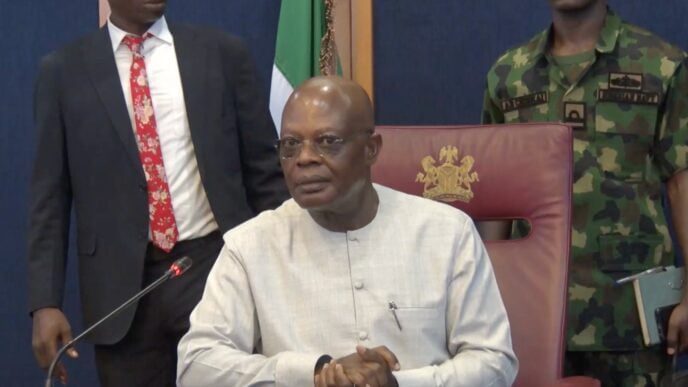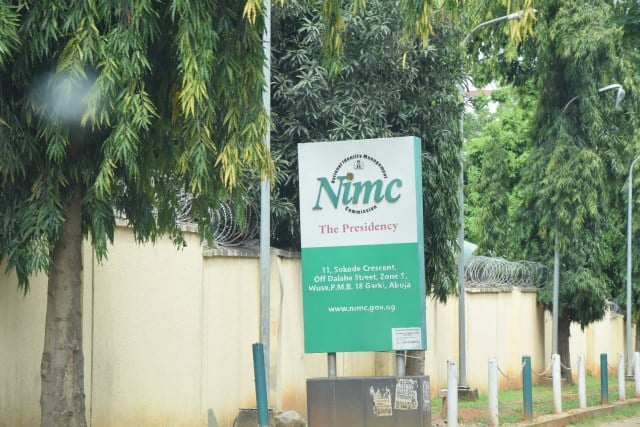Nigeria’s trade relations with the United States hit a combined value of N31.05 trillion between 2015 and 2024, according to data from the National Bureau of Statistics (NBS).
TheCableIndex analysis shows that within the 10-year period, Nigeria imported American goods worth N14.71 trillion, while exports to the US stood at N16.34 trillion.
The report said the African giant recorded a trade surplus of N1.63 trillion (meaning that Nigeria exported more to the US than it imported), even though yearly fluctuations show that the country ran deficits in some years, particularly in 2015 and 2020.
In 2024 alone, Nigeria’s exports to the US climbed to an all-time high of N5.52 trillion — up from N2.61 trillion in 2023 and N334.55 billion in 2015.
Advertisement
On April 2, President Donald Trump announced sweeping global tariffs on all imports into the country, including a 14 percent levy on Nigerian goods.
Announcing the tariffs during the ‘Make America Wealthy Again’ event at the White House, Trump said the policy would “supercharge” domestic manufacturing and revive American jobs.
“Jobs and factories will come roaring back into our country… This will be, indeed, the golden age of Americans coming back,” he declared.
Advertisement
Trump’s action has ignited concerns from global leaders and Nigeria’s government.
Jumoke Oduwole, minister of industry, trade, and investment, warned that the newly introduced 10 percent tariff on key export categories could weaken Nigeria’s competitiveness in the U.S. market and threaten non-oil exports that have benefited from the African Growth and Opportunity Act (AGOA) exemptions.
“A new 10% tariff on key categories may impact the competitiveness of Nigerian goods in the U.S.,” Oduwole said in a statement.
“For businesses in the non-oil sector, these measures present destabilising challenges to price competitiveness and market access, especially in emerging and value-added sectors vital to our diversification agenda.
Advertisement
“SMEs building their business models around AGOA exemptions will face the pressures of rising costs and uncertain buyer commitments.”
The minister said over the past two years, Nigeria’s annual exports to the US have steadily remained between $5 billion and $6 billion.
She noted that “crude petroleum, mineral fuels, oils, and gas-related products” make up more than 90 percent of the exports.
Further analysis of the NBS data shows that Nigeria’s imports from the US surged in 2024, hitting N4.07 trillion — almost seven times higher than the N581.99 billion recorded in 2015.
Advertisement
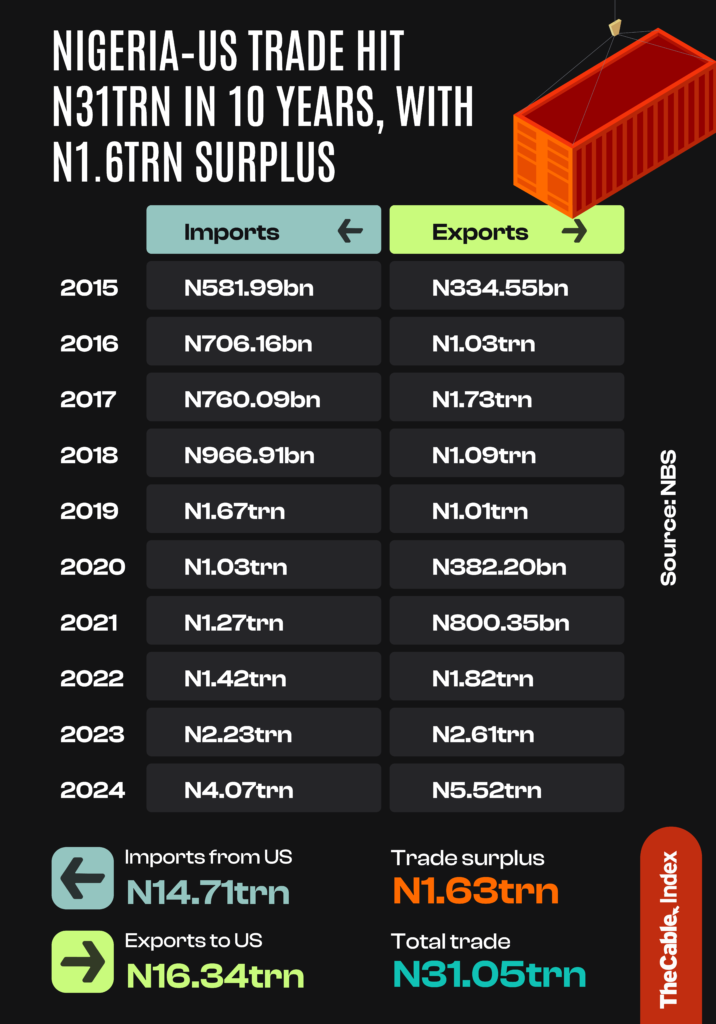
Over the past decade, it was observed that Nigeria maintained a trade surplus with the US in six out of the 10 years examined, with the highest surplus posted in 2024 at N1.45 trillion.
Advertisement
AFRICA STILL MATTERS — BUT LAGS IN IMPORTS
While Africa plays a key role in Nigeria’s export economy, the data indicates that it is lagging as a source of imports for the continent’s giant.
Advertisement
The NBS said between 2015 and 2024, Nigeria imported goods of N7.45 trillion from African countries — about half of the N14.71 trillion spent on imports from the US within the same period.
More so, imports from America outpaced those from Africa every year in the period reviewed, with the highest value recorded in 2024, when Nigeria bought N4.07 trillion worth of goods from America, compared to N2.16 trillion from African nations.
Advertisement
The data highlights a significant pattern of imbalance, suggesting that African countries buy more from Nigeria than they sell to it.
For instance, the continent is a major destination for Nigerian crude oil, refined products, and agricultural exports — totalling N30.42 trillion in the decade — nearly double the N16.34 trillion exported to the US.
Oduwole said Trump’s tariff on Nigeria was a strong signal for Africa to start trading more within its continent through the African Continental Free Trade Area (AfCFTA) agreement.
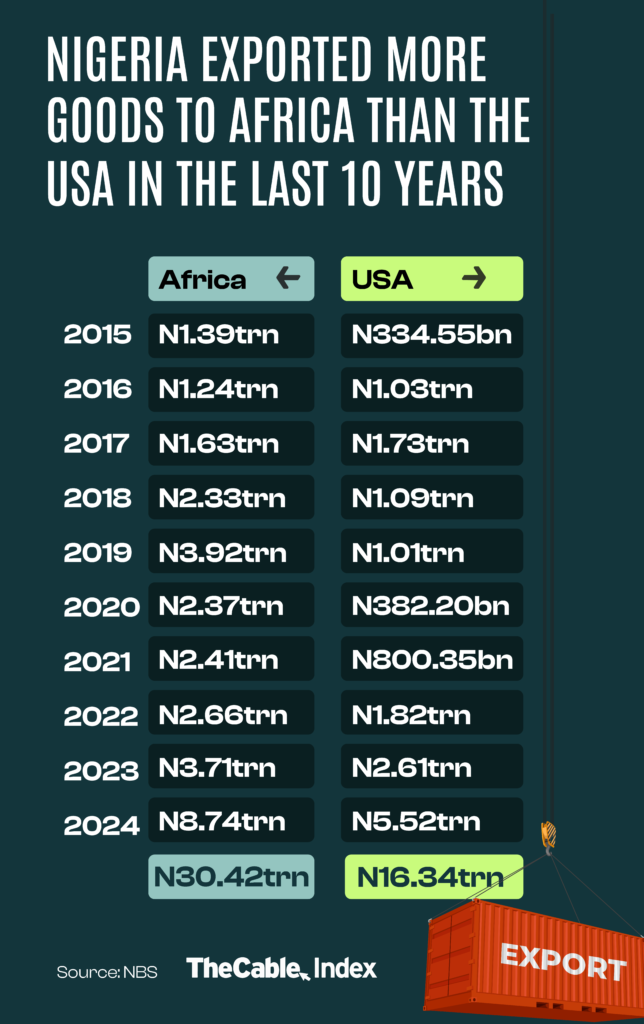
The AfCFTA is a trade pact brokered by the African Union (AU) to boost intra-African trade.
“Reinforcing the case for Nigeria’s accelerated implementation of the AfCFTA, deepening regional integration, and leveraging frameworks like the Pan-African Payment and Settlement System (PAPSS) to lower trade costs and promote intra-African trade,” she said.
‘RETALIATING WITH HIGHER TARIFFS WOULD HURT NIGERIA MORE’
Muhammad Bello, an economist, stressed the importance of strategic responses to the new levy, advising against Nigeria retaliating with higher tariffs, as that could exacerbate inflation.
“Reciprocating with higher tariffs against the U.S. would not be a wise move and could harm Nigeria more than it would impact the US,” he told TheCable.
“Most of our imports from the US are cars, refined crude oil, spare parts and other machinery parts, equipment and other instruments which are very important for our domestic production and meet our domestic demand.
“The implication of retaliating here is that these imports would now become more expensive. This would jack up costs for businesses and consumers, worsening inflation, which is already one of our major concerns.
“Instead of a tit-for-tat, the best thing for us to do is to respond strategically through negotiating and even exploring alternative markets such that we no longer border (sic) what they do.”
Bello also advocated for a stronger focus on Africa, especially in light of the AfCFTA, which promises to open up vast economic opportunities for Nigeria.
He said while the shift towards Africa cannot completely replace oil exports to the US, non-oil exports like agriculture and fertilisers will benefit from greater regional integration.
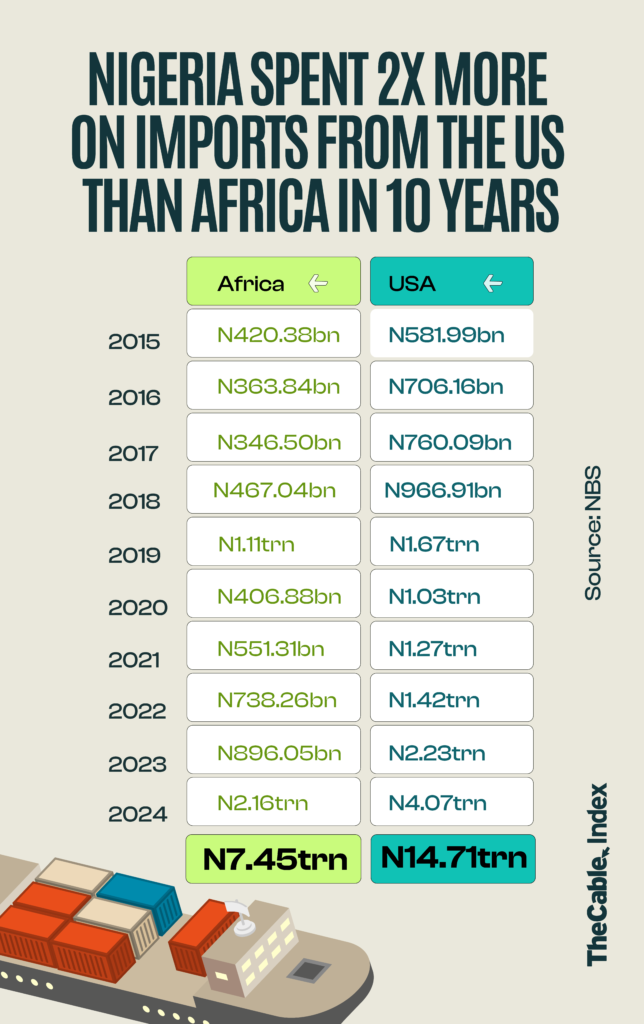
‘NIGERIA POSITIONED TO WITHSTAND US TARIFF SHOCK’
Wale Edun, minister of finance and coordinating minister of the economy, says Nigeria is positioned to withstand global trade disruptions, including the new US tariffs.
Speaking at the corporate governance forum organised by the Ministry of Finance Incorporated (MOFI) in Abuja, Edun said while oil and minerals are exempted from the tariffs, the broader economic impact could be felt through declining oil prices.
He stressed that Nigeria remains relatively insulated due to early reforms and a shift in economic strategy.
“Nigeria-US trade has been in surplus in the last three years (2022-2024),” Edun said.
“Consequently, the tariff effect on exports is negligible if we sustain our oil and minerals export volume.
“The adverse effect on Nigeria will be through the oil price plunge, and we are intensifying efforts to ramp up crude oil production to curtail any price effect.”
The minister said Nigeria is also focusing on non-oil revenue mobilisation, with “budget adjustment and prioritisation where possible, and also innovative non-debt financing strategies”.

